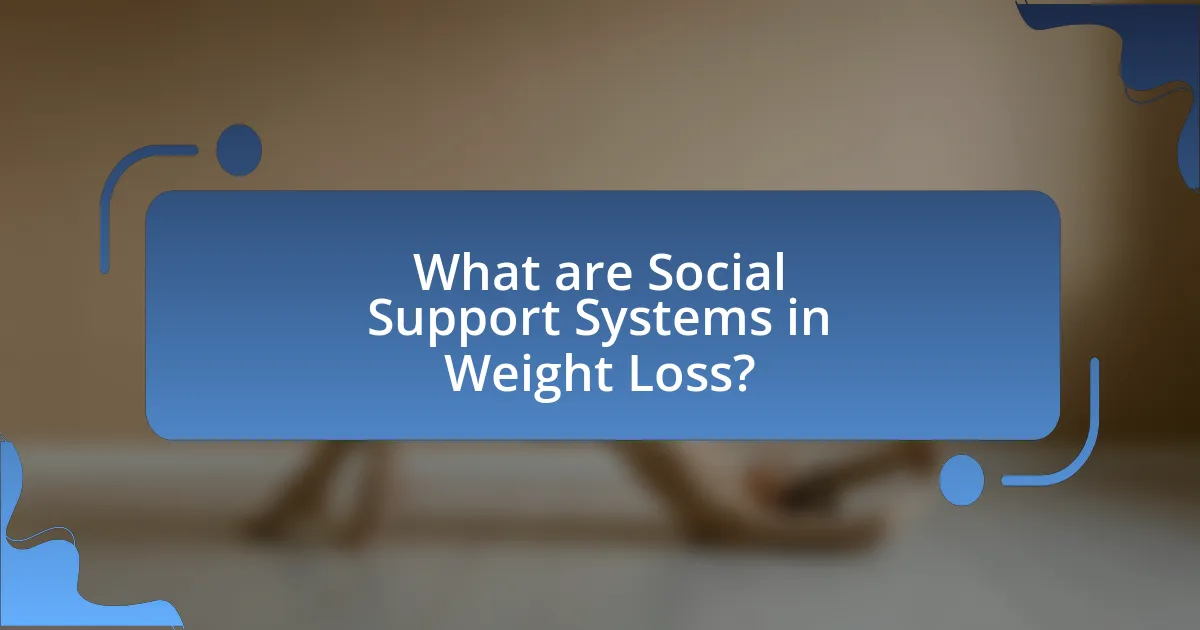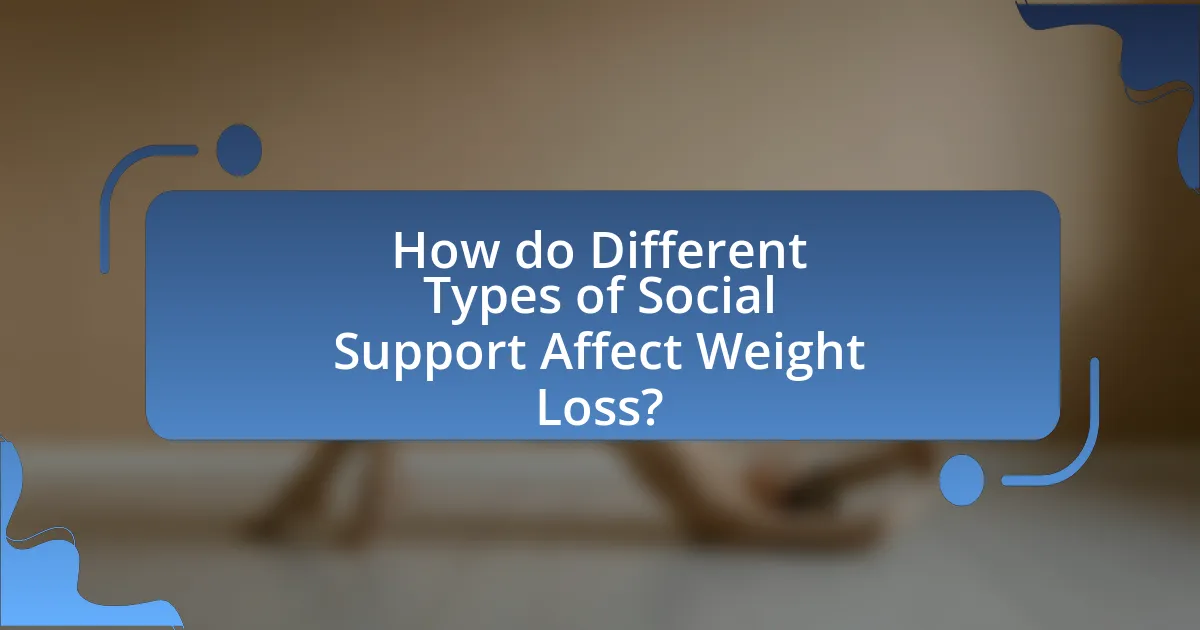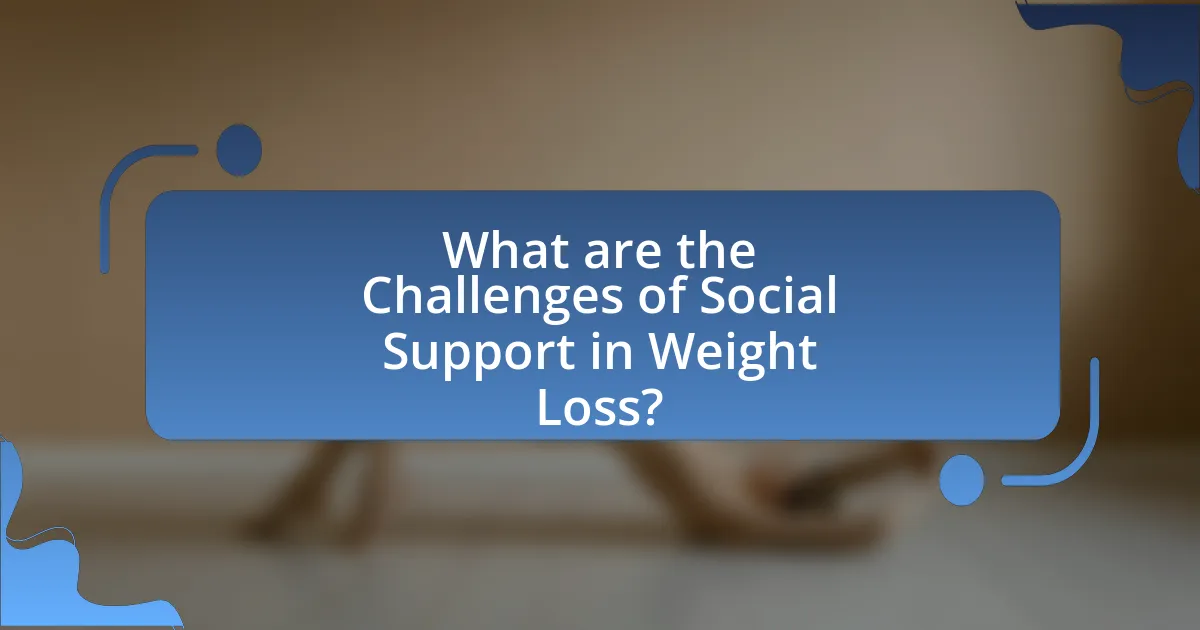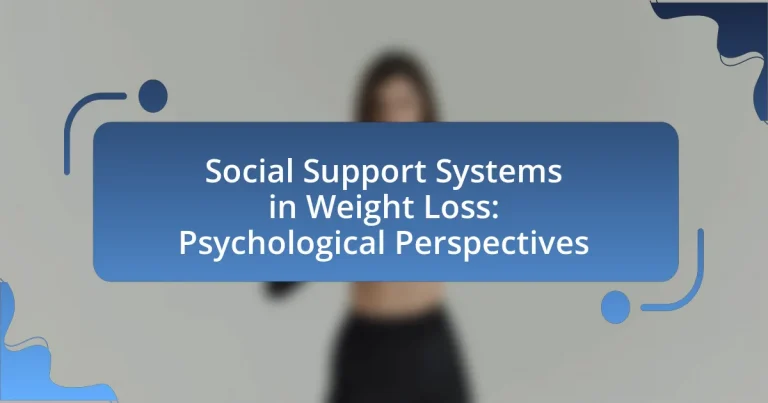Social support systems in weight loss encompass the networks of family, friends, and support groups that provide essential emotional, informational, and practical assistance to individuals striving to lose weight. The article explores how these systems enhance motivation, accountability, and adherence to weight loss goals, highlighting the effectiveness of emotional, informational, and tangible support. It discusses the psychological mechanisms underlying social support, the impact of peer groups, and the role of accountability in achieving weight loss success. Additionally, the article addresses the challenges individuals may face in accessing social support and offers strategies to overcome these barriers, emphasizing the importance of building supportive networks for effective weight management.

What are Social Support Systems in Weight Loss?
Social support systems in weight loss refer to the networks of individuals, such as family, friends, and support groups, that provide emotional, informational, and practical assistance to individuals attempting to lose weight. These systems play a crucial role in enhancing motivation, accountability, and adherence to weight loss goals. Research indicates that individuals with strong social support are more likely to achieve and maintain weight loss, as evidenced by a study published in the journal Obesity, which found that participants with supportive social networks lost more weight compared to those without such support.
How do social support systems influence weight loss outcomes?
Social support systems significantly enhance weight loss outcomes by providing emotional, informational, and practical assistance. Research indicates that individuals with strong social support are more likely to adhere to weight loss programs, experience greater motivation, and achieve better results. For instance, a study published in the journal “Obesity” found that participants who engaged in group weight loss programs lost more weight compared to those who worked alone, highlighting the impact of collective encouragement and accountability. Additionally, social support can reduce feelings of isolation and stress, which are often barriers to successful weight management.
What types of social support are most effective in weight loss?
Emotional support, informational support, and tangible support are the most effective types of social support in weight loss. Emotional support involves encouragement and empathy from friends or family, which can enhance motivation and adherence to weight loss goals. Informational support includes sharing knowledge about healthy eating and exercise, helping individuals make informed choices. Tangible support refers to practical assistance, such as joining workout sessions or preparing healthy meals together, which can facilitate lifestyle changes. Research indicates that individuals with strong social support networks are more likely to achieve and maintain weight loss, as evidenced by a study published in the journal “Obesity” by Wing and Jeffery, which found that participants with social support lost more weight than those without.
How does emotional support contribute to weight loss success?
Emotional support significantly contributes to weight loss success by enhancing motivation and adherence to weight loss plans. Individuals who receive emotional support from friends, family, or support groups are more likely to stay committed to their dietary and exercise goals. Research indicates that social support can lead to better weight loss outcomes; for instance, a study published in the journal “Obesity” found that participants with strong social support lost more weight and maintained their weight loss over time compared to those without such support. This is attributed to the encouragement, accountability, and shared experiences that emotional support provides, which can help individuals navigate challenges and maintain a positive mindset throughout their weight loss journey.
Why are social connections important in the weight loss journey?
Social connections are important in the weight loss journey because they provide emotional support, accountability, and motivation. Research indicates that individuals with strong social networks are more likely to achieve their weight loss goals, as social support can enhance adherence to diet and exercise regimens. A study published in the journal Obesity found that participants who engaged in group weight loss programs lost more weight than those who worked alone, highlighting the impact of social interactions on weight management. Additionally, social connections can reduce feelings of isolation and stress, which are often barriers to successful weight loss.
What role does accountability play in weight loss support systems?
Accountability plays a crucial role in weight loss support systems by fostering commitment and motivation among individuals. When participants are held accountable, they are more likely to adhere to their weight loss goals and engage in healthier behaviors. Research indicates that accountability mechanisms, such as regular check-ins or group meetings, significantly enhance weight loss outcomes. For instance, a study published in the journal “Obesity” found that individuals who participated in a structured accountability program lost more weight compared to those who did not have such support. This demonstrates that accountability not only encourages consistency but also reinforces the social aspect of weight loss, making individuals feel more connected and supported in their journey.
How do peer groups affect motivation and adherence to weight loss plans?
Peer groups significantly enhance motivation and adherence to weight loss plans by providing social support, accountability, and shared experiences. Research indicates that individuals who engage with supportive peer groups are more likely to achieve their weight loss goals due to increased motivation derived from group dynamics and encouragement. For instance, a study published in the journal “Obesity” found that participants in group weight loss programs lost more weight compared to those who pursued weight loss individually, highlighting the impact of social interaction on adherence. Additionally, peer groups foster a sense of belonging and shared commitment, which can lead to sustained behavioral changes and improved outcomes in weight management.
What psychological mechanisms underlie social support in weight loss?
Social support in weight loss is primarily underpinned by mechanisms such as emotional support, informational support, and appraisal support. Emotional support provides encouragement and empathy, which can enhance motivation and reduce feelings of isolation during the weight loss journey. Informational support involves sharing knowledge and strategies that can help individuals make healthier choices, thereby facilitating behavior change. Appraisal support offers constructive feedback and validation, which can boost self-esteem and reinforce commitment to weight loss goals. Research indicates that individuals with strong social support networks are more likely to achieve and maintain weight loss, as evidenced by a study published in the journal “Obesity” by Wing and Jeffery, which found that social support significantly correlates with successful weight management outcomes.
How does social comparison impact weight loss efforts?
Social comparison significantly impacts weight loss efforts by influencing motivation and self-perception. Individuals often evaluate their progress against others, which can either enhance or hinder their commitment to weight loss goals. Research indicates that positive social comparisons, where individuals perceive themselves as doing better than peers, can boost motivation and adherence to weight loss programs. Conversely, negative comparisons, where individuals feel they are falling behind, can lead to decreased motivation and increased feelings of inadequacy. A study published in the journal “Health Psychology” by K. S. K. Kwan and colleagues found that social comparison processes are linked to emotional responses that affect weight loss outcomes, highlighting the dual nature of social comparison in shaping individuals’ weight loss journeys.
What is the role of self-efficacy in relation to social support?
Self-efficacy plays a crucial role in enhancing the effectiveness of social support. Individuals with high self-efficacy are more likely to seek and utilize social support effectively, which can lead to better weight loss outcomes. Research indicates that self-efficacy influences the perception and acceptance of social support, as those who believe in their ability to succeed are more inclined to engage with supportive networks. For instance, a study published in the Journal of Health Psychology found that higher self-efficacy was associated with increased utilization of social support resources, ultimately contributing to more successful weight management.

How do Different Types of Social Support Affect Weight Loss?
Different types of social support significantly affect weight loss by influencing motivation, accountability, and emotional well-being. Emotional support, such as encouragement from friends and family, can enhance an individual’s commitment to weight loss goals, as evidenced by a study published in the journal “Obesity,” which found that participants with strong emotional support lost more weight than those without it. Informational support, including sharing knowledge about healthy eating and exercise, also plays a crucial role; research indicates that individuals who receive practical advice are more likely to adopt healthier behaviors. Additionally, tangible support, such as joining a workout group or participating in meal prep, fosters a sense of community and accountability, which has been shown to improve adherence to weight loss programs. Overall, the presence of diverse social support types correlates with more effective weight loss outcomes.
What are the main categories of social support in weight loss?
The main categories of social support in weight loss are emotional support, informational support, instrumental support, and appraisal support. Emotional support involves providing empathy, care, and encouragement, which can enhance motivation and adherence to weight loss goals. Informational support includes sharing knowledge, advice, and resources related to weight loss strategies, helping individuals make informed decisions. Instrumental support refers to tangible assistance, such as helping with meal preparation or accompanying someone to exercise, which can facilitate the weight loss process. Appraisal support involves providing feedback and affirmation, helping individuals assess their progress and maintain motivation. These categories are essential as research indicates that social support significantly influences weight loss outcomes and long-term maintenance.
How does informational support aid in weight loss?
Informational support aids in weight loss by providing individuals with knowledge and resources necessary for making healthier choices. This type of support can include guidance on nutrition, exercise, and behavioral strategies that promote weight loss. Research indicates that individuals who receive informational support are more likely to adopt effective weight management practices, as evidenced by a study published in the journal “Obesity,” which found that participants who received structured information about diet and exercise lost more weight compared to those who did not receive such support. This demonstrates that access to accurate information can empower individuals to make informed decisions, ultimately facilitating their weight loss journey.
What is the impact of tangible support on weight loss success?
Tangible support significantly enhances weight loss success by providing individuals with practical resources and assistance that facilitate healthier behaviors. Research indicates that individuals who receive tangible support, such as meal preparation, exercise companionship, or financial assistance for healthy food options, are more likely to adhere to weight loss programs and achieve their goals. A study published in the journal “Obesity” by Wing and Jeffery (1999) found that participants who received tangible support from family and friends lost more weight compared to those who did not receive such support. This evidence underscores the importance of tangible support in promoting sustained weight loss efforts and improving overall outcomes.
How do family dynamics influence weight loss support?
Family dynamics significantly influence weight loss support by shaping the emotional and practical resources available to individuals. Supportive family environments, characterized by encouragement and shared healthy behaviors, enhance motivation and adherence to weight loss goals. Conversely, negative dynamics, such as criticism or lack of involvement, can hinder progress and lead to feelings of isolation. Research indicates that families who engage in collective activities, such as cooking healthy meals together, foster a sense of accountability and shared commitment, which is crucial for successful weight management. Studies show that individuals with supportive family structures are more likely to achieve and maintain weight loss compared to those without such support systems.
What strategies can families use to support weight loss efforts?
Families can support weight loss efforts by creating a healthy home environment, encouraging physical activity, and promoting balanced eating habits. Establishing a supportive atmosphere involves removing unhealthy snacks and incorporating nutritious foods into meals, which can lead to better dietary choices. Additionally, families can engage in physical activities together, such as walking, biking, or participating in sports, which not only fosters bonding but also increases overall activity levels. Research indicates that social support from family members significantly enhances weight loss success, as individuals are more likely to adhere to their goals when they feel encouraged and accountable to their loved ones.
How does spousal support affect weight loss outcomes?
Spousal support positively affects weight loss outcomes by providing emotional encouragement and accountability. Research indicates that individuals with supportive spouses are more likely to adhere to weight loss plans and achieve their goals. A study published in the journal “Obesity” found that couples who engage in weight loss efforts together experience greater success, as mutual motivation and shared activities enhance commitment to healthier lifestyles. This support system fosters a conducive environment for weight loss, making it easier for individuals to maintain dietary changes and exercise routines.

What are the Challenges of Social Support in Weight Loss?
The challenges of social support in weight loss include lack of understanding, differing goals, and potential negative influences from social circles. Individuals seeking weight loss may find that their friends or family do not fully comprehend the dietary and lifestyle changes required, leading to unsupportive comments or behaviors. Additionally, when social support systems have differing health goals, such as maintaining weight or unhealthy eating habits, it can create friction and undermine motivation. Research indicates that negative social influences can lead to decreased adherence to weight loss plans, as individuals may feel pressured to conform to the eating habits of their peers.
What barriers exist in accessing social support for weight loss?
Barriers to accessing social support for weight loss include stigma, lack of availability, and inadequate social networks. Stigma can deter individuals from seeking help due to fear of judgment or negative perceptions associated with weight loss efforts. Additionally, many people may find that social support systems, such as weight loss groups or community programs, are not readily available in their area, limiting their options for assistance. Furthermore, individuals with weak social networks may struggle to find supportive relationships that encourage healthy behaviors, as highlighted in research by Wing and Jeffery (1999), which emphasizes the importance of social connections in successful weight loss interventions.
How can negative social interactions hinder weight loss progress?
Negative social interactions can hinder weight loss progress by increasing stress and reducing motivation. Stress from negative interactions can lead to emotional eating, where individuals consume high-calorie foods as a coping mechanism. Research indicates that social support is crucial for successful weight loss; a study published in the journal “Obesity” found that individuals with supportive social networks are more likely to achieve their weight loss goals. Conversely, negative interactions can diminish self-esteem and create feelings of isolation, which further impede adherence to healthy behaviors.
What role does stigma play in seeking social support for weight loss?
Stigma significantly hinders individuals from seeking social support for weight loss. This stigma often manifests as negative societal attitudes towards obesity, leading to feelings of shame and embarrassment among those struggling with weight issues. Research indicates that individuals who perceive stigma are less likely to engage in social support networks, as they fear judgment or ridicule from peers and family. A study published in the journal “Obesity” by Puhl and Heuer (2010) found that weight-based stigma can deter individuals from accessing health services and support systems, ultimately impeding their weight loss efforts. Thus, stigma creates a barrier to social support, which is crucial for successful weight management.
How can individuals overcome challenges in social support systems?
Individuals can overcome challenges in social support systems by actively seeking and engaging with supportive networks. Research indicates that social support significantly influences weight loss outcomes, as individuals who receive encouragement and accountability from peers are more likely to succeed in their weight loss efforts. For instance, a study published in the journal “Health Psychology” found that participants who engaged in group support settings lost more weight compared to those who did not have such support. By fostering relationships with friends, family, or support groups, individuals can enhance their motivation and resilience, thereby effectively navigating the challenges posed by social support systems.
What strategies can enhance the effectiveness of social support?
To enhance the effectiveness of social support, individuals can utilize strategies such as fostering open communication, setting specific goals, and creating accountability structures. Open communication allows for the expression of needs and feelings, which strengthens relationships and ensures that support is relevant and timely. Setting specific goals provides clear targets for both the individual and their support network, making it easier to track progress and celebrate achievements. Creating accountability structures, such as regular check-ins or support groups, reinforces commitment and encourages sustained engagement. Research indicates that these strategies can significantly improve outcomes in weight loss efforts, as they align with psychological principles of motivation and social influence.
How can technology facilitate social support in weight loss?
Technology can facilitate social support in weight loss by providing platforms for communication, motivation, and accountability among individuals. Mobile applications and online communities enable users to share their progress, challenges, and successes, fostering a sense of belonging and encouragement. Research indicates that social support through technology can enhance weight loss outcomes; for instance, a study published in the Journal of Medical Internet Research found that participants using social media for weight loss support lost more weight compared to those who did not engage with online communities. Additionally, wearable devices that track physical activity and dietary habits can connect users with friends or support groups, allowing for real-time feedback and motivation, which is crucial for maintaining commitment to weight loss goals.
What practical tips can enhance social support for weight loss?
To enhance social support for weight loss, individuals can engage in group activities, such as joining weight loss support groups or fitness classes, which foster a sense of community and accountability. Research indicates that social support significantly influences weight loss outcomes; for instance, a study published in the journal Obesity found that participants who engaged in group-based interventions lost more weight compared to those who worked alone. Additionally, sharing progress and challenges with friends or family through regular check-ins can strengthen motivation and commitment, as social interactions provide encouragement and reinforcement.
How can individuals build a supportive network for weight loss?
Individuals can build a supportive network for weight loss by actively engaging with friends, family, and community groups who share similar health goals. Establishing regular communication, such as weekly check-ins or group workouts, fosters accountability and motivation. Research indicates that social support significantly enhances weight loss outcomes; for instance, a study published in the journal “Obesity” found that participants with strong social networks lost more weight than those without such support. By leveraging these relationships, individuals can create an environment conducive to achieving their weight loss objectives.
What are effective ways to communicate weight loss goals to others?
Effective ways to communicate weight loss goals to others include being clear, specific, and open about your objectives. Clearly stating your goals, such as “I aim to lose 10 pounds in three months,” provides a concrete target that others can understand and support. Sharing your motivations, such as improving health or increasing energy levels, can foster empathy and encouragement from your social circle. Additionally, discussing your plan, including dietary changes and exercise routines, allows others to offer relevant support and accountability. Research indicates that social support significantly enhances weight loss success, as individuals who share their goals are more likely to receive encouragement and motivation from their peers, leading to better adherence to their weight loss plans.

